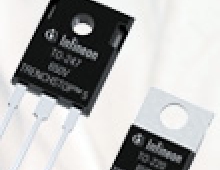
Infineon Seperates Memory Division
Infineon Technologies announced plans to separate its memory division from the rest of the company.
The German chipmaker announced Thursday its intention to spin off the memory
division, which accounted for 41% of the company's total revenue in its latest
third quarter. Infineon will concentrate on the logic business -- providing
analog, mixed-signal and radio-frequency chips to the automotive and
industrial electronics industries.
"There are two essential reasons for taking this step," Chairman Wolfgang Ziebart said in a statement. "First, the processes and business models for memory and logic are developing in diverging directions. Second, we improve the growth dynamic and profitability potential for both companies."
According to the company, the memory products business, which primarily makes DRAM memory, will be carved out as a legally independent entity by July 1, 2006, with a subsequent IPO as the ideal option.
Infineon joins Advanced Micro Devices, which has filed IPO registration documents for Spansion, its memory subsidiary that is a joint venture with Fujitsu. Other companies have sold their memory divisions outright, as Texas Instruments did when it sold its memory unit to Micron in 1998.
Exiting the memory business is a double-edged sword for a company like Infineon, because logic and memory could increasingly be integrated into a single chip as the market for consumer electronic gadgets evolves.
However, it remains to be seen whether Infineon's memory unit can survive on its own, without the cushion that comes from being part of a larger, diversified company. Samsung, one of the world's major memory makers, can handle swings in that sector because of revenue from its various other businesses, like consumer electronics and flat-panel displays.
"There are two essential reasons for taking this step," Chairman Wolfgang Ziebart said in a statement. "First, the processes and business models for memory and logic are developing in diverging directions. Second, we improve the growth dynamic and profitability potential for both companies."
According to the company, the memory products business, which primarily makes DRAM memory, will be carved out as a legally independent entity by July 1, 2006, with a subsequent IPO as the ideal option.
Infineon joins Advanced Micro Devices, which has filed IPO registration documents for Spansion, its memory subsidiary that is a joint venture with Fujitsu. Other companies have sold their memory divisions outright, as Texas Instruments did when it sold its memory unit to Micron in 1998.
Exiting the memory business is a double-edged sword for a company like Infineon, because logic and memory could increasingly be integrated into a single chip as the market for consumer electronic gadgets evolves.
However, it remains to be seen whether Infineon's memory unit can survive on its own, without the cushion that comes from being part of a larger, diversified company. Samsung, one of the world's major memory makers, can handle swings in that sector because of revenue from its various other businesses, like consumer electronics and flat-panel displays.



















